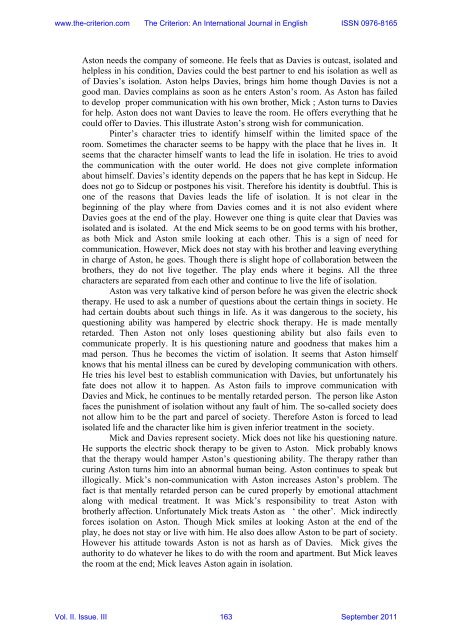Vol. II. Issue. III September 2011 - The Criterion: An International ...
Vol. II. Issue. III September 2011 - The Criterion: An International ...
Vol. II. Issue. III September 2011 - The Criterion: An International ...
You also want an ePaper? Increase the reach of your titles
YUMPU automatically turns print PDFs into web optimized ePapers that Google loves.
www.the-criterion.com <strong>The</strong> <strong>Criterion</strong>: <strong>An</strong> <strong>International</strong> Journal in English ISSN 0976-8165<br />
Aston needs the company of someone. He feels that as Davies is outcast, isolated and<br />
helpless in his condition, Davies could the best partner to end his isolation as well as<br />
of Davies’s isolation. Aston helps Davies, brings him home though Davies is not a<br />
good man. Davies complains as soon as he enters Aston’s room. As Aston has failed<br />
to develop proper communication with his own brother, Mick ; Aston turns to Davies<br />
for help. Aston does not want Davies to leave the room. He offers everything that he<br />
could offer to Davies. This illustrate Aston’s strong wish for communication.<br />
Pinter’s character tries to identify himself within the limited space of the<br />
room. Sometimes the character seems to be happy with the place that he lives in. It<br />
seems that the character himself wants to lead the life in isolation. He tries to avoid<br />
the communication with the outer world. He does not give complete information<br />
about himself. Davies’s identity depends on the papers that he has kept in Sidcup. He<br />
does not go to Sidcup or postpones his visit. <strong>The</strong>refore his identity is doubtful. This is<br />
one of the reasons that Davies leads the life of isolation. It is not clear in the<br />
beginning of the play where from Davies comes and it is not also evident where<br />
Davies goes at the end of the play. However one thing is quite clear that Davies was<br />
isolated and is isolated. At the end Mick seems to be on good terms with his brother,<br />
as both Mick and Aston smile looking at each other. This is a sign of need for<br />
communication. However, Mick does not stay with his brother and leaving everything<br />
in charge of Aston, he goes. Though there is slight hope of collaboration between the<br />
brothers, they do not live together. <strong>The</strong> play ends where it begins. All the three<br />
characters are separated from each other and continue to live the life of isolation.<br />
Aston was very talkative kind of person before he was given the electric shock<br />
therapy. He used to ask a number of questions about the certain things in society. He<br />
had certain doubts about such things in life. As it was dangerous to the society, his<br />
questioning ability was hampered by electric shock therapy. He is made mentally<br />
retarded. <strong>The</strong>n Aston not only loses questioning ability but also fails even to<br />
communicate properly. It is his questioning nature and goodness that makes him a<br />
mad person. Thus he becomes the victim of isolation. It seems that Aston himself<br />
knows that his mental illness can be cured by developing communication with others.<br />
He tries his level best to establish communication with Davies, but unfortunately his<br />
fate does not allow it to happen. As Aston fails to improve communication with<br />
Davies and Mick, he continues to be mentally retarded person. <strong>The</strong> person like Aston<br />
faces the punishment of isolation without any fault of him. <strong>The</strong> so-called society does<br />
not allow him to be the part and parcel of society. <strong>The</strong>refore Aston is forced to lead<br />
isolated life and the character like him is given inferior treatment in the society.<br />
Mick and Davies represent society. Mick does not like his questioning nature.<br />
He supports the electric shock therapy to be given to Aston. Mick probably knows<br />
that the therapy would hamper Aston’s questioning ability. <strong>The</strong> therapy rather than<br />
curing Aston turns him into an abnormal human being. Aston continues to speak but<br />
illogically. Mick’s non-communication with Aston increases Aston’s problem. <strong>The</strong><br />
fact is that mentally retarded person can be cured properly by emotional attachment<br />
along with medical treatment. It was Mick’s responsibility to treat Aston with<br />
brotherly affection. Unfortunately Mick treats Aston as ‘ the other’. Mick indirectly<br />
forces isolation on Aston. Though Mick smiles at looking Aston at the end of the<br />
play, he does not stay or live with him. He also does allow Aston to be part of society.<br />
However his attitude towards Aston is not as harsh as of Davies. Mick gives the<br />
authority to do whatever he likes to do with the room and apartment. But Mick leaves<br />
the room at the end; Mick leaves Aston again in isolation.<br />
<strong>Vol</strong>. <strong>II</strong>. <strong>Issue</strong>. <strong>II</strong>I 163 <strong>September</strong> <strong>2011</strong>
















